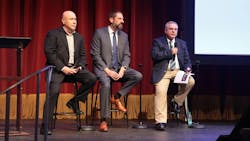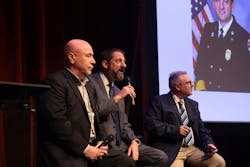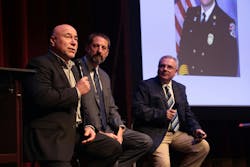FireFusion 2024: Technology Drives Collaboration in Charleston-Area Fire Service
The auto aid agreement that was implemented within Charleston County, SC, after the 2007 Sofa Super Store Fire changed everything. It ensured that any entity would have the correct tools to deal with whatever response they had in front of them, and that no one would have to go through that same pain of losing nine firefighters.
The “Redefining Fire Protection in the Aftermath of the 2007 Sofa Super Store Fire” session at FireFusion 2024 was a panel of retired Fire Chief Greg Bulanow of the North Charleston Fire Department, director of Charleston County Consolidated Emergency Communications Center (ECC), Jim Lake, and Charleston Fire Chief Dan Curia. The three discussed the creation of the auto aid agreement and the benefits of implementing their ECC.
After the tragic incident, there were some changes that needed to be made to improve responses altogether in the Charleston area. The difficulty of dealing with blurred jurisdiction lines and maneuvering bridges between cities was so immense prior to the agreement, the only way to really tell the true jurisdiction was by the color of the trash cans.
There was a need for new leadership between entities and egos to be managed for the agreement to flourish and develop into something of actuality. Chiefs had to put aside their egos, and there was major resistance at first because people were stuck in their own ways of doing things.
"I spent my whole life with one department, and I thought we did it the best way. I was wrong. I needed to change," said Bulanow.
The first document presented was a mutual aid agreement rather than auto aid and it was produced in the December after the incident. The mutual aid agreement required the chief officer to put in the request for additional resources and it was 64 pages long. Needless to say, improvements have been made since, with five departments within the Charleston area participating in the auto aid agreement.
“There were times that it was extremely difficult. It was a grind. It was very difficult. There was strong internal resistance to automatic aid. Working through the details were extremely challenging, and it would have been very easy to give up, but I think at the chief level, there was a strong commitment that we never wanted this to happen again, so we put in the hard work to keep pushing forward to get it done,” said Bulanow.
Operations that changed with the new agreement were apparatus renumbering, radio channels and SOPs. Engines changed from single digits to 100 and 200 numbers, because they couldn’t have three separate Engine 3’s responding to the same call. The radio channel bank opened to three channels for whoever was responding to the call as opposed to one single channel. SOP development involved mayday operations and firefighter accountability.
“At the time of the (Sofa Super Store) fire, we did not work together very much at all. There would occasionally be if we had a large fire and exhausted our resources. Then, we would call for help. Typically, that never really went well, and that's because we didn't train well. We didn't train at all together, and it was almost seen as like a sign of defeat. We had to call somebody to help us put out fires,” said Curia.
The synergy of the entities was a crucial steppingstone to creating the auto aid agreement, because someone or something needed to coordinate the effort. The Charleston County ECC was the backbone of the effort. It serves as a coordinating source for dispatch, a central point for the records management system, coordinating a “clearing house” of data points to improve the situational awareness of responders, manages response packages and connects everything in the region.
That falls into line that Lake emphasized operations should be the thing driving technology, not technology driving operations. Lake also shared the ALASTAR program that provides an overview of the county and unit location for everyone to be in the loop if something major is going on.
“There's a lot of things that we do in the background all in support of the agencies. We just got a $1.2 million grant. What that means is we can now extend auto aid into Summerville, which is another county, and other agencies. So, we're looking at how we expand this more and more regionally,” said Lake.
The panel emphasized two incidents where the auto aid paid off and crises were averted. The first was the Palms Apartments fire on Feb. 7, 2022. It was a three-alarm fire that had nine agencies on-scene with an abundance resources. There was no issue with the fire and the fluidity of the operations.
A story from Curia about how he asked Bulanow, who was in charge at the scene, what he needed of him. Immediately, Bulanow told Curia what he needed, and the request was fulfilled, but that response from Bulanow took Curia by surprise because it speaks to the effort of putting egos aside to serve the public in the best way possible.
The second was on June 5, 2024, when container ship MSC Michigan VII was moving towards the port and bridge twice as fast, due to a stuck throttle. Agencies had minutes to respond, and set up the actions that were either going to be life-saving or life-threatening. The agencies worked together to direct safe passage of the vessel, shut down the bridge in both directions, clear vehicles, mobilize marine assets, clear harbor traffic, deal with the wake from the vessel and tend to injuries from the wake.
If there wasn’t the prior training together, if there wasn’t the agreement, if it hadn’t been implemented, things would have turned out a lot worse for all those involved.
After highlighting those two incidents, the question was posed about how to maintain/improve the system, and these were the suggestions:
- Continue to manage egos
- Keep an eye on the bigger picture
- The first responsibility is to deliver the best service possible
- Acknowledge and embrace differences
- Standardize as much as possible
- A consolidated dispatch board
However, for those starting at ground zero, there were suggestions for building relationships and copying those around you. This is a tough program to build from the ground up, so looking at what your neighbors are doing and getting boots on the ground to see successful operations is crucial. Also, it was spotlighted that relationships drive the program. Relationships were what built the agreement in the first place.
At the end of the day, the panel wanted an outlook of the greater good over anything. They want agencies to improve every day, to be more in congruence with one another and with technology with the ultimate goal of serving the public. They want people to take the long view, and realize that the days are long, but the years are short.

Ryan Baker
Ryan Baker is a writer and associate editor with prior experiences in online and print production. Ryan is an associate editor for T&D World and Firehouse, while he is going to graduate school in pursuit of a master's degree in sciences of communication at University of Wisconsin-Whitewater. He recently completed a year of teaching Intro to Public Speaking at UW-Whitewater, as part of his graduate program. Ryan acquired his bachelor's degree in journalism in 2023 from UW-Whitewater, and operates currently out of Minneapolis, MN. Baker, also writes freelances for the Ultimate Frisbee Association (UFA) in his free time, while also umpiring baseball for various ages across the Twin Cities Metro Area.








